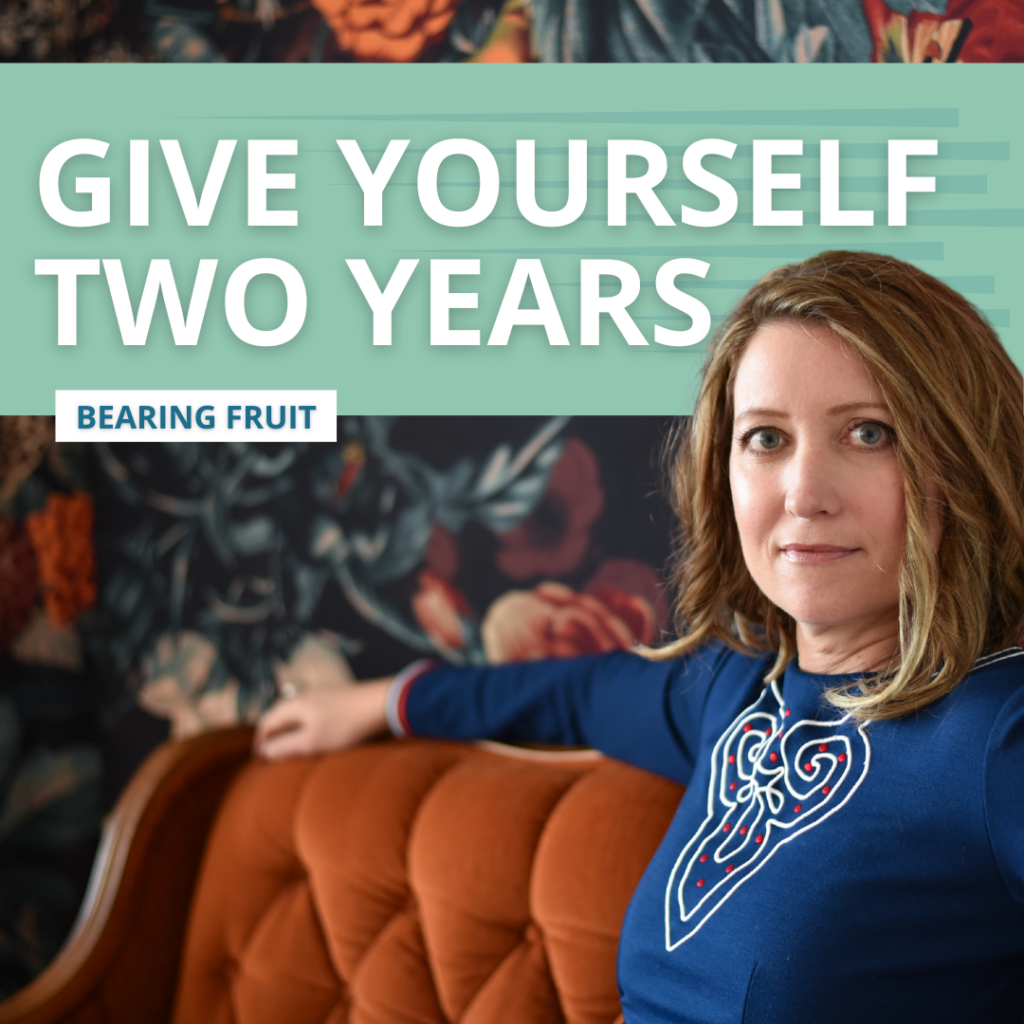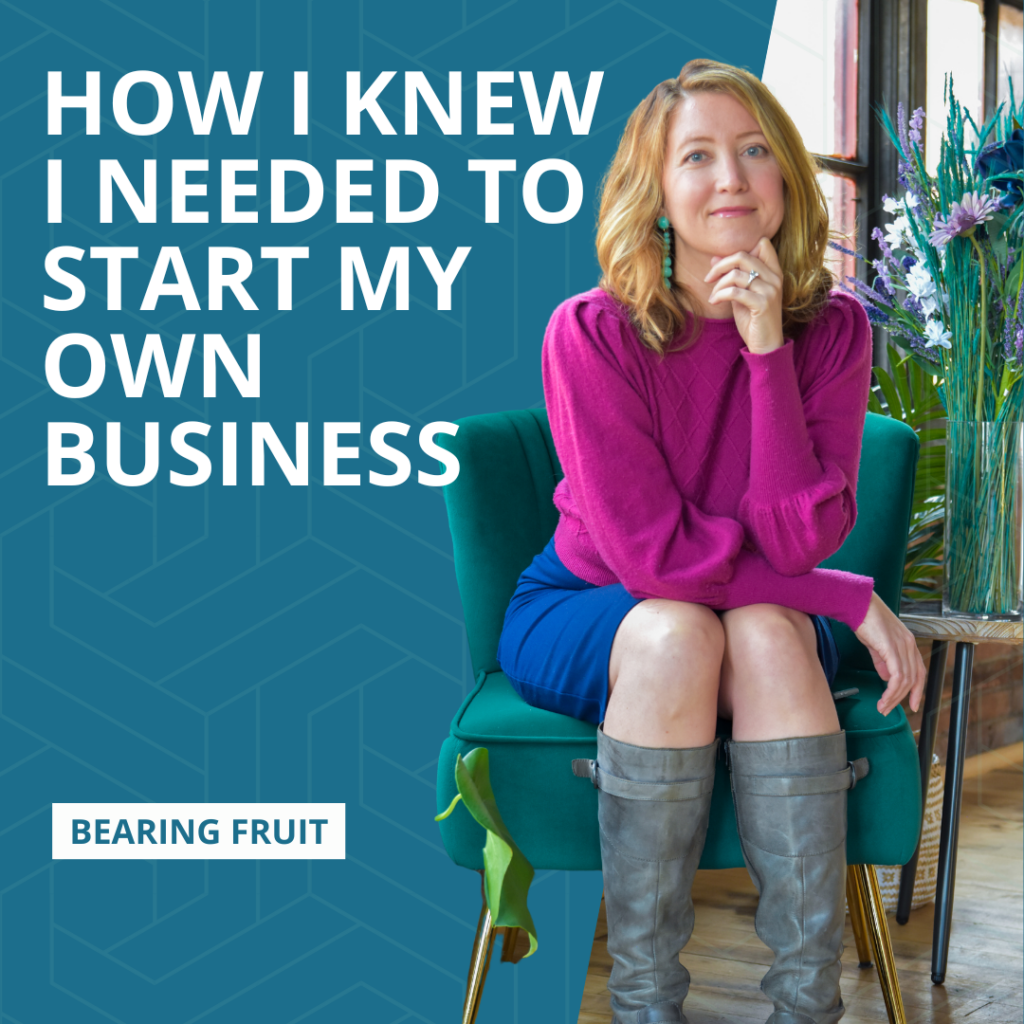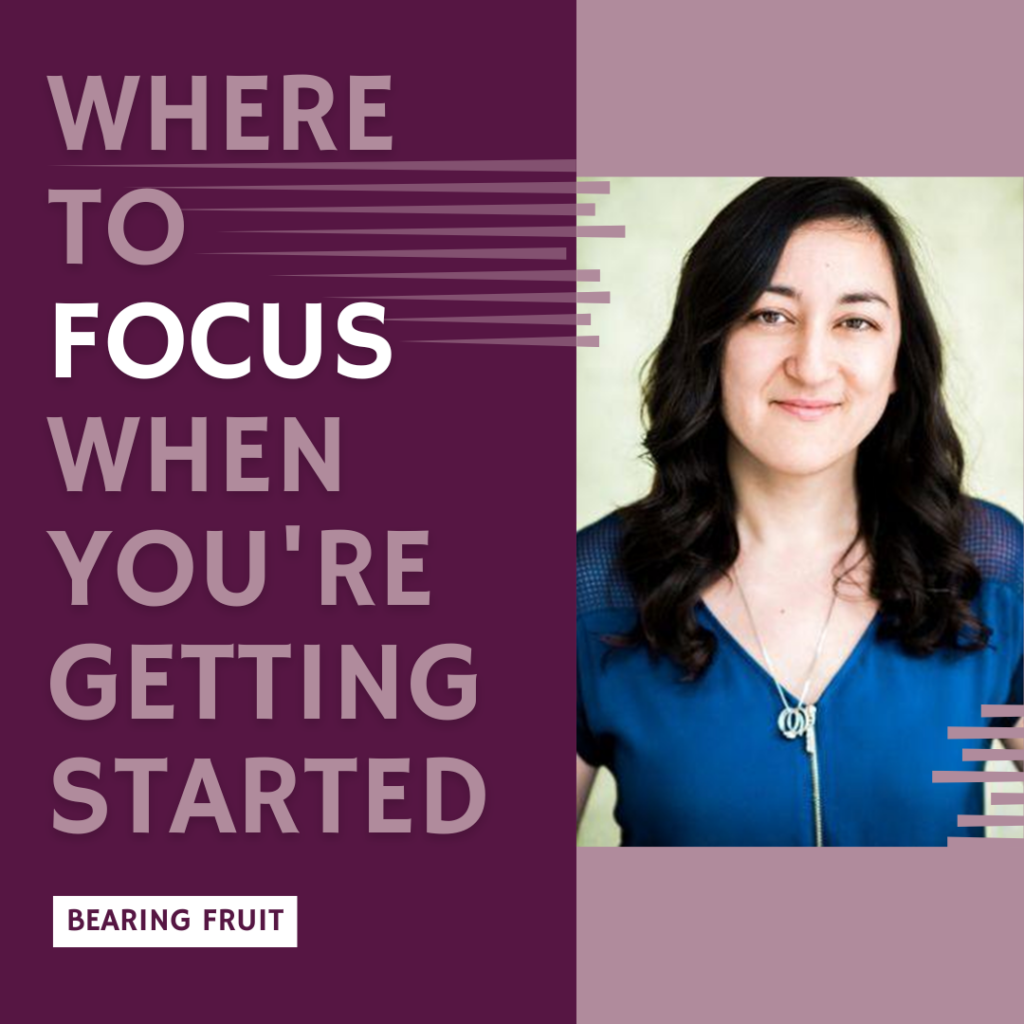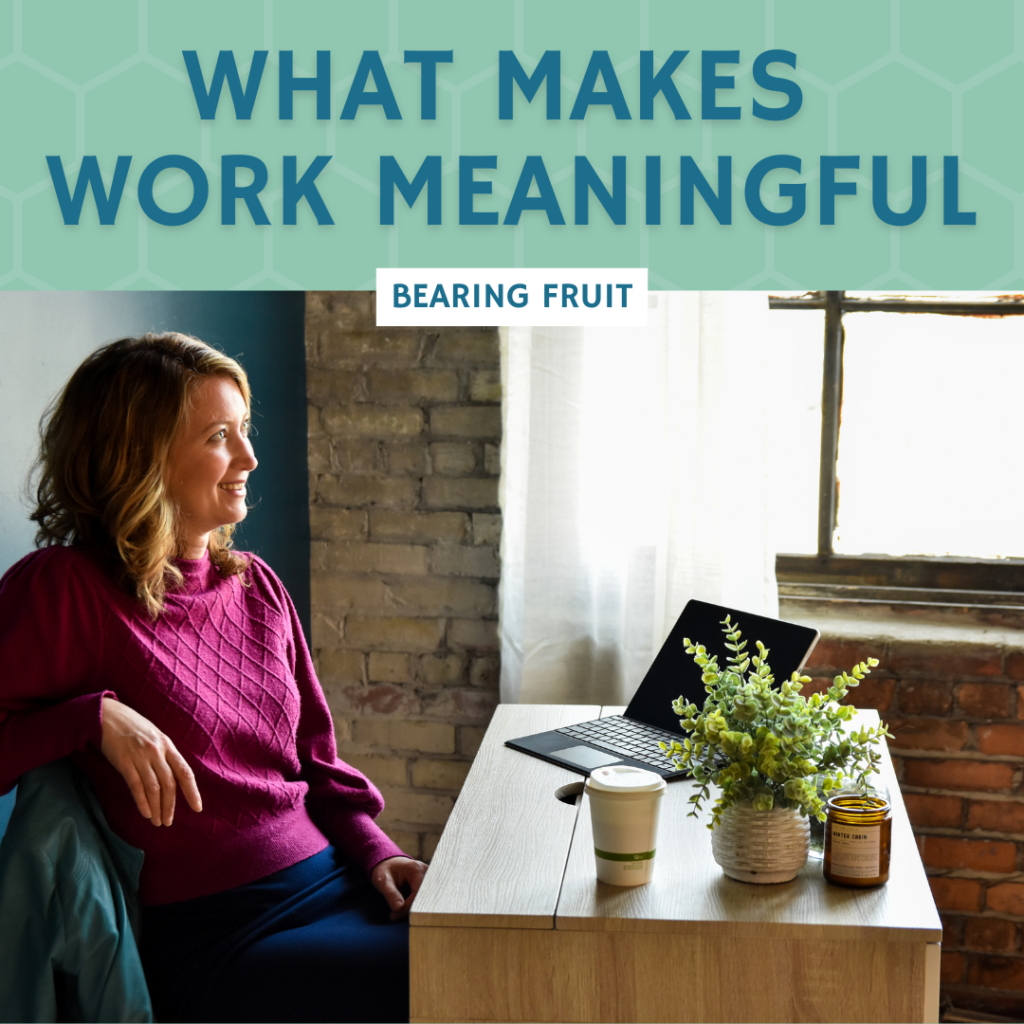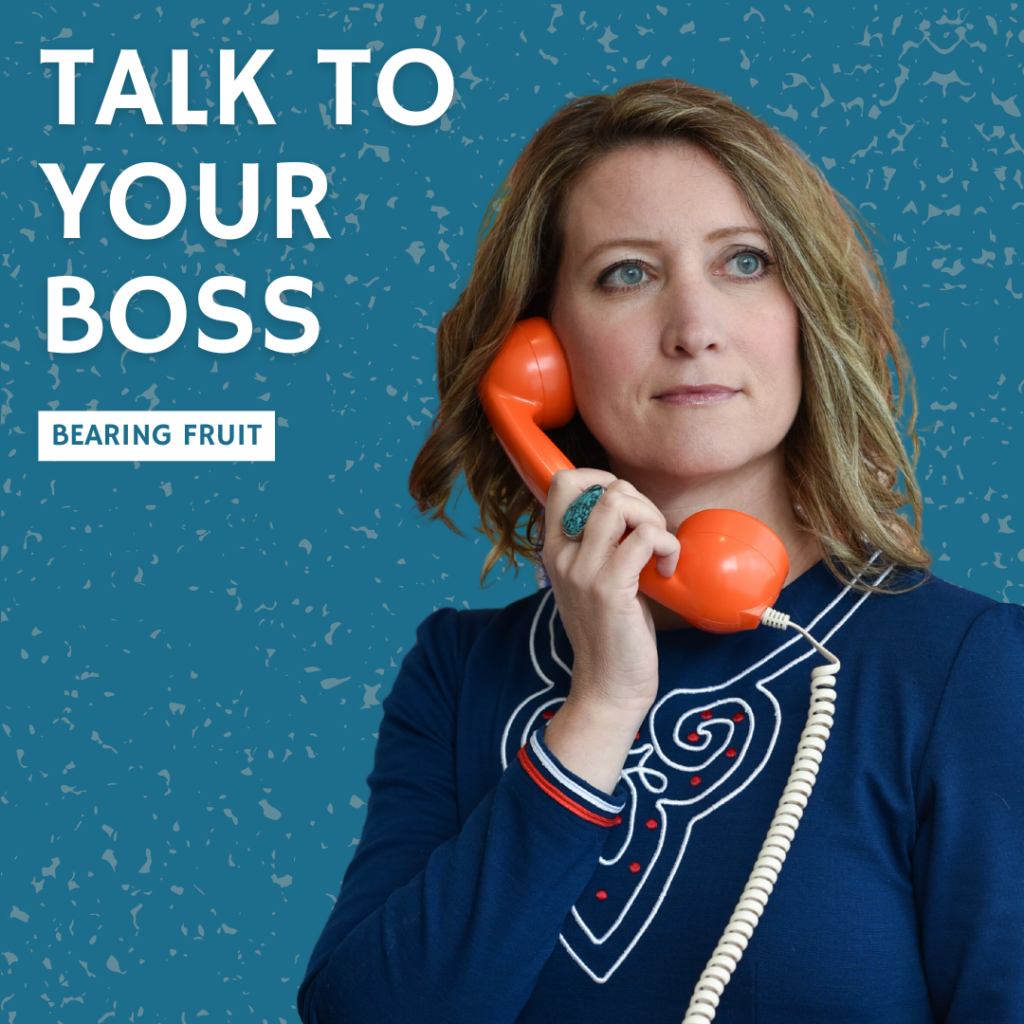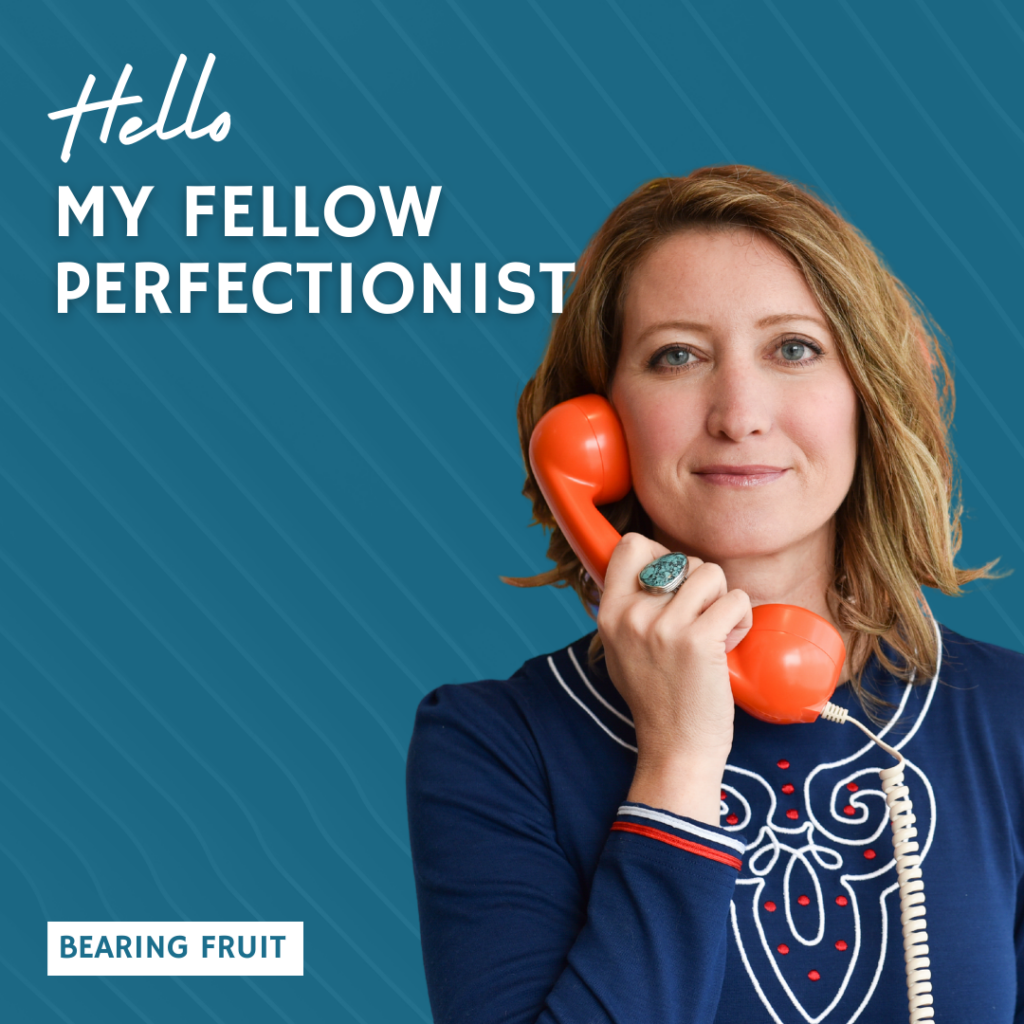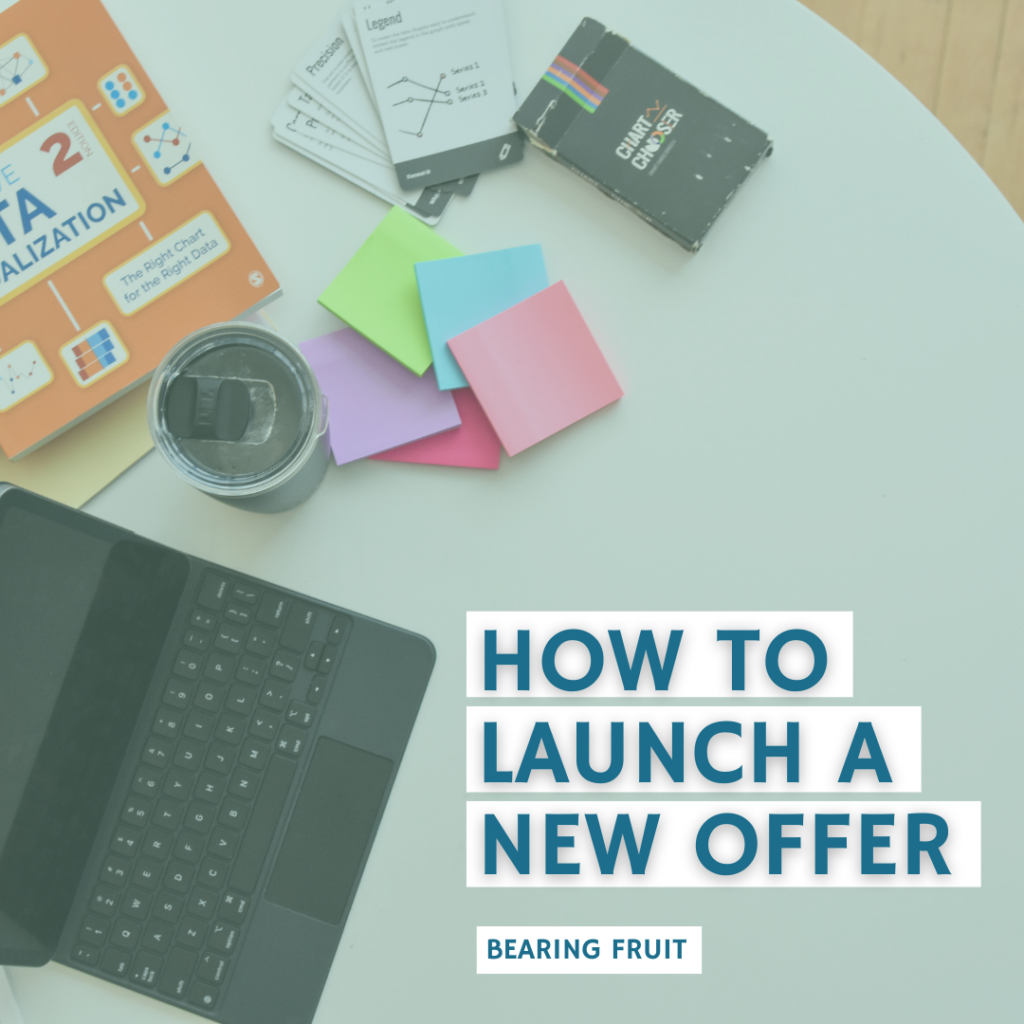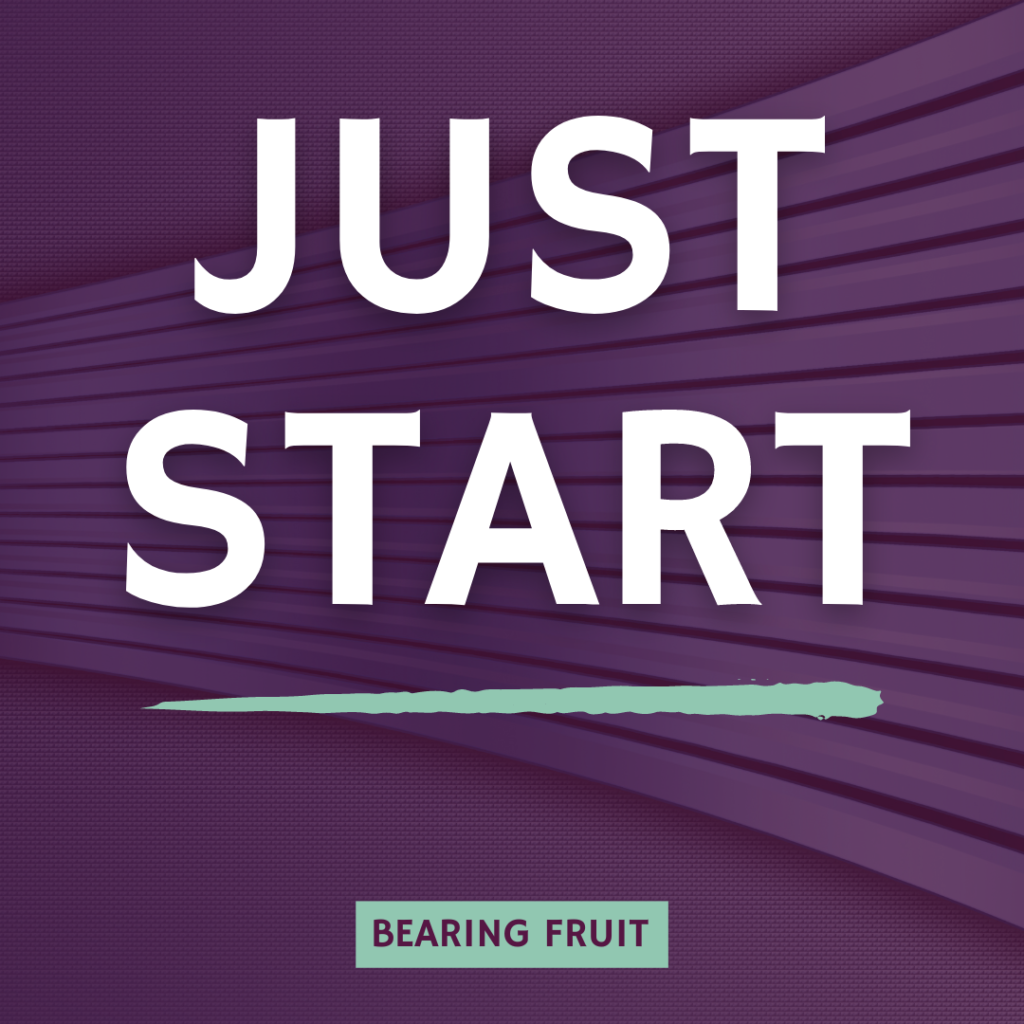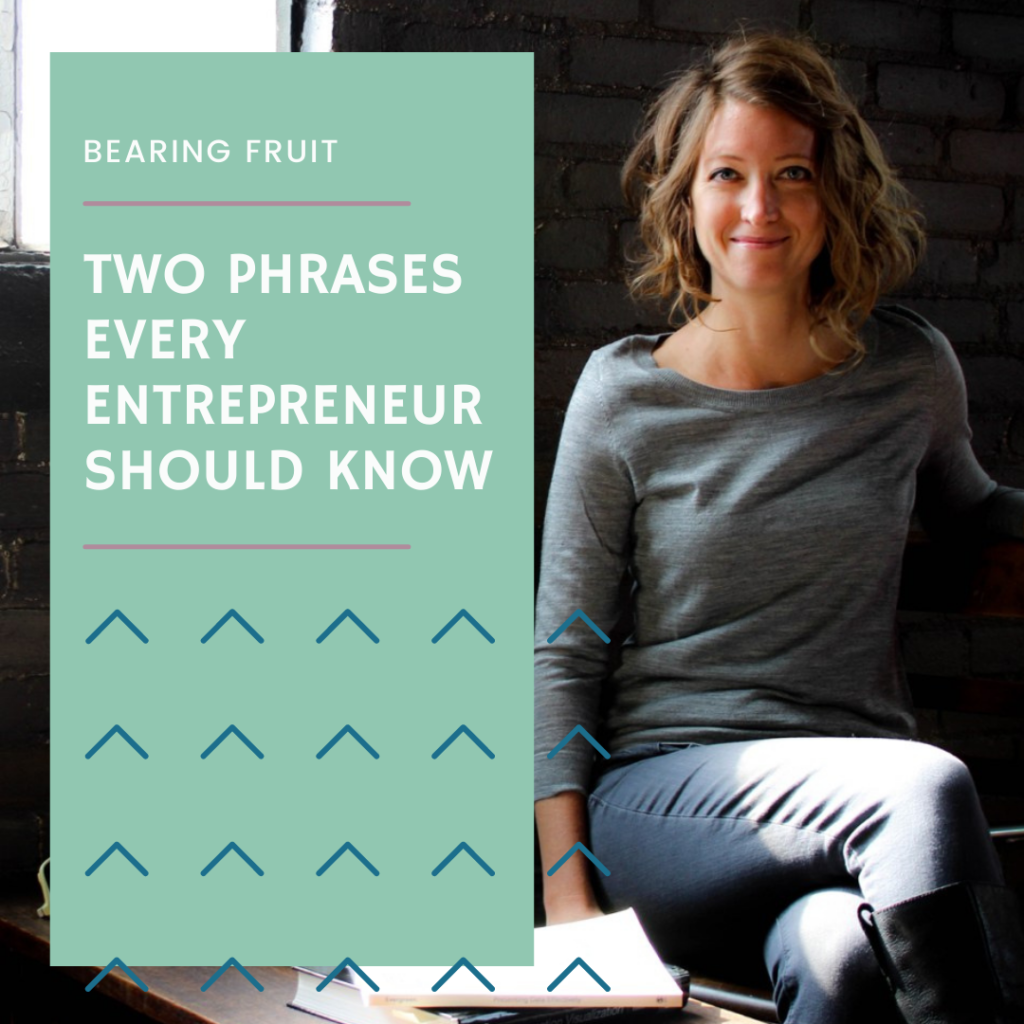Give Yourself Two Years
To be totally transparent, I’ve thought about closing down the weekly Bearing Fruit newsletter more than once. It takes a lot of *all I’ve got* to write to you this often, especially with some kind of clarity or insight.
And I knew that if the newsletter shuts down, so goes Boost & Bloom, my course for founders.
“It’s fine,” I thought. “This isn’t a big money maker for me. I just love nurturing other people’s businesses. But I’ll get a bunch of my time back and that’s healthy.”
I announced my wavering to my students. One of them immediately wrote back with:
“I just got actual money, in my LLC account 25 minutes before I read this email.”
(It’s these victories that make my heart sing.)
She said, “You cannot scale back on this course. You are two years of snowflakes on their way to an avalanche.”
It takes two years.
She’s right. Building something as complex as a new business (mine included!) takes about two years.
I see this in my taekwondo journey and you can probably map out something similar in your own life.
I recently passed my blue belt test.

At my dojo, that’s halfway to a black belt. If you’re consistent with your practice – meaning you come to class twice a week, practice a bit at home, and dial in your nutrition, sleep, and stress – you can be a black belt in two years.
It took me two years of homeownership to fully realize allllllll the labor it requires.
The first year I planted my garden, it was sparse – just a few flowers. The second year? Total smokeshow.
If I was watching taekwondo YouTube videos once a month, it would take me much, much longer, if not forever to gain the skills of a black belt.
In other words, two years seems to be the shortest time to evolve something new.
The shortcut comes when you have:
A coach, who can give you personal and specific feedback
A plan, showing you what to handle when
Consistency, where you show up on a regular basis week after week
Patience, so you don’t beat yourself up for taking the time it just takes
You need that amount of space to see the seasons.
The ups and downs. To get enough experience that you make mistakes you can learn from. To let word of mouth work its magic. To get comfortable with the discomfort.
It takes two years because there’s so much to build – and you also need to keep your head on your body and your soul intact. Keep breathing.
Though I have nothing but experience to back this up, I think two years is also the time to evaluate if your efforts are paying off.
Let’s say you’ve decided to launch a video series on LinkedIn. You’ve consistently produced weekly, informative videos about your specialty, as a form of content marketing to turn some viewers into clients. If you’ve been working at this for two years and you’ve gotten maybe one client and your videos are only garnering a dozen likes, it’s time to cut your losses and focus your content marketing elsewhere.
If you started a newsletter two years ago but only published twice and you’ve got just your parents on your email list, it’s time to re-evaluate. Perhaps you shut it down. Perhaps you need a coach, a plan, consistency, and patience.
If you’ve been building your business behind the scenes for two solid years before you get your first deposit into your LLC account, you should celebrate. Your hard work is working. That timing sounds about right.
I promised to protect names where requested, so this student will stay anonymous, but check out this result, almost two years after enrolling in Boost & Bloom:
“I’m not exaggerating when I say that the $2,000 class has already led to a 37% increase in my monthly profits. And I only work about 25-27 billable hours a week due to my work/life balance goals.”
(There goes my heart singing again.)
Vinu knew:
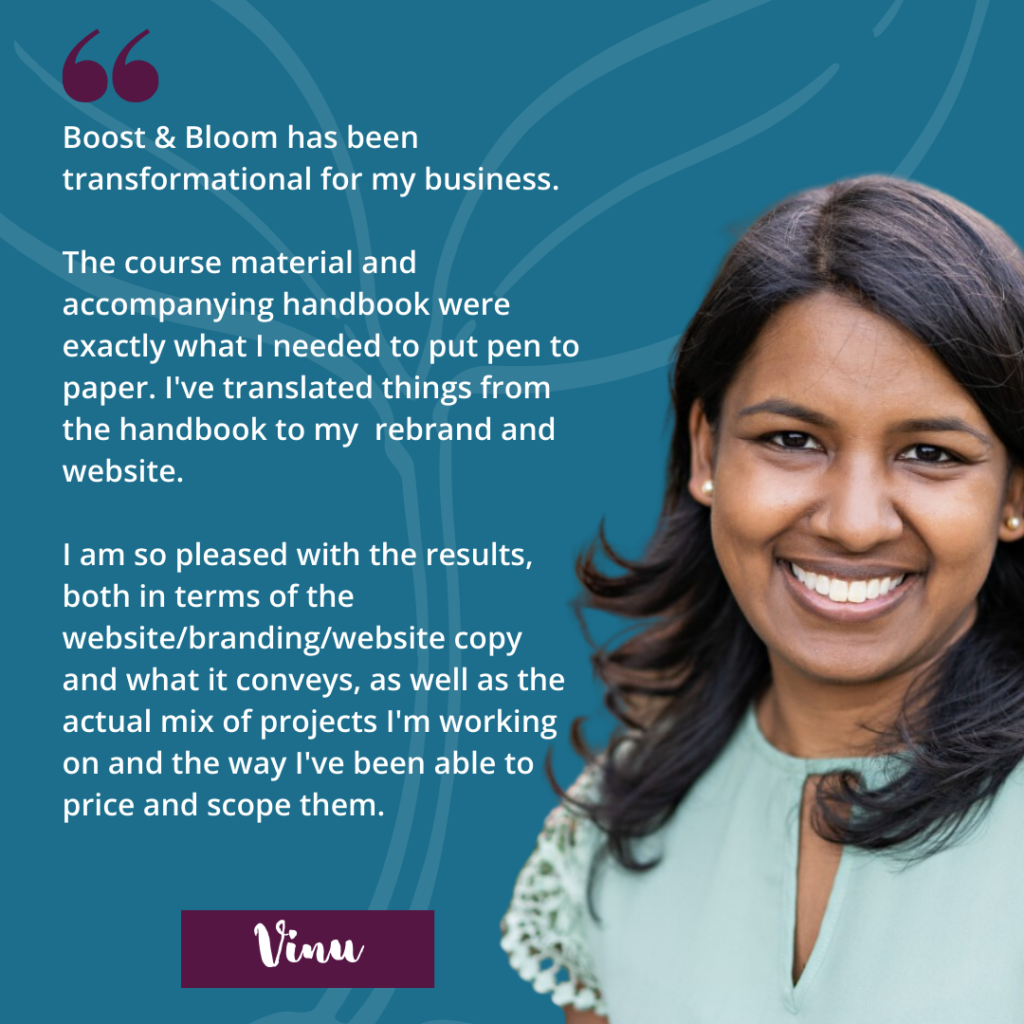
You can feel around in the dark and take forever but you’ll go further faster with a coach, a plan, consistency, and patience.
Folks with businesses already established will see results even sooner. This is what happened to Mara, after only 10 months in my course:
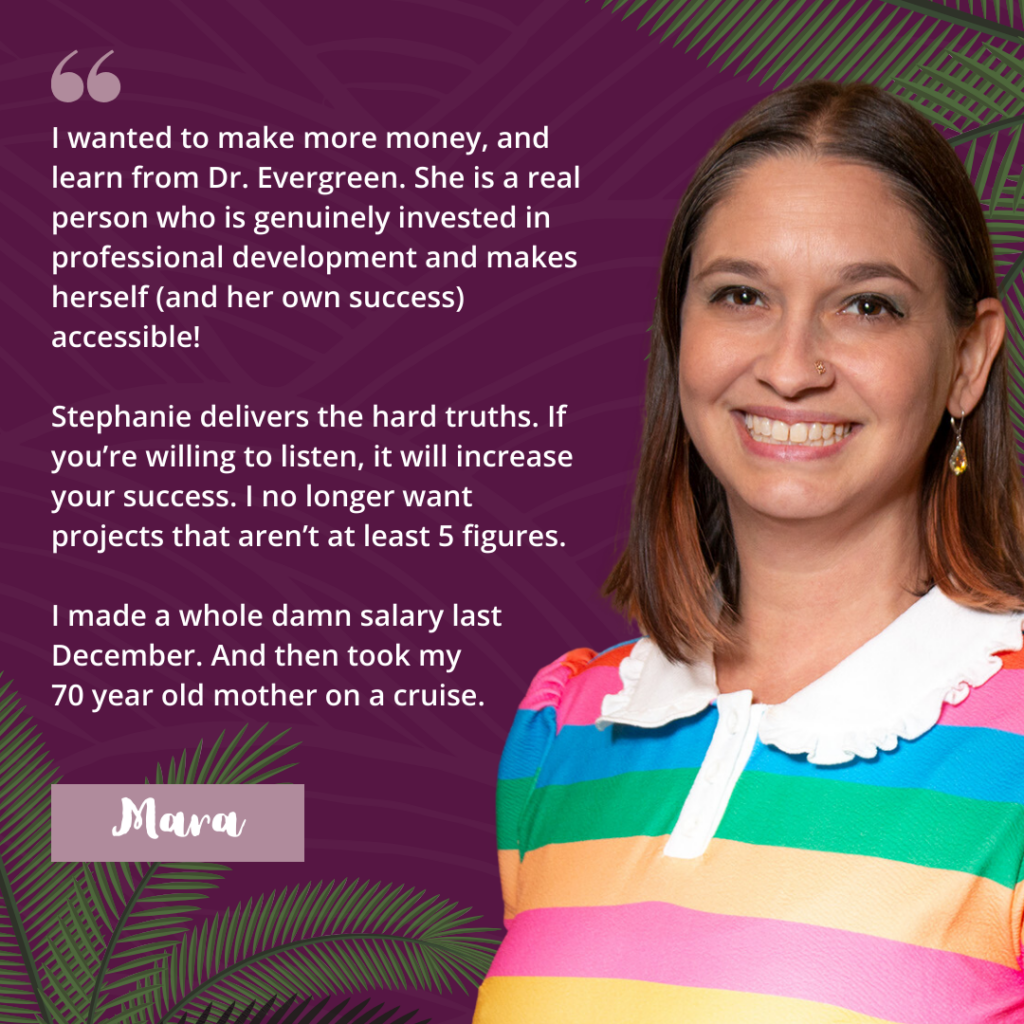
Took her mom on a cruise! Damn, that’s cute.
Join us in Boost & Bloom and give yourself two years to grow. Enrollment closes tomorrow.
I’ll bring the coaching and the plans. You bring the patience and consistency. We’ve got this.
How I Knew I Needed To Start My Own Business
I absolutely did not intend to be an entrepreneur. Had I done so, I would have likely pursued an MBA – which, in hindsight, woulda been a huge mistake. The strength of my business, what gives me so much appeal, is my deep subject matter knowledge. You know, the degrees I pursued instead of an MBA.
But when I was sitting in a coffee shop parking lot, texting a friend, “I think I’m going to get fired” I knew I could run a business better than my boss. This dude could write a grant (and so could I) but he had no idea how to run a company.
In hindsight, there were some clear indications that I needed to work for myself:
I was a bad employee.
Indeed, I’ve had more than one boss refer to me as “insubordinate.” Which would have hurt my feelings had I not already been called “oppositional” by many a teacher throughout my public education experience.
I can’t follow directions. I mean, technically I CAN. But if the directions lack logic or ethics or reason, if they’re unclear or a blanket punishment for one person’s miscalculation, I struggle to abide on principle.
When the head admin would comment “leaving early, are we?” because I was walking out at 3pm when I’d been in the office since 6am and worked a focus group during evening hours the night before, I knew that the concept of a 9 to 5 didn’t square with my work style.
When the hours you spend with your butt in the seat matter more than the fact you could spend those hours playing solitaire, and that makes you mad, you aren’t cut out for a corporate work ethic.
I needed support.
My independent streak might have backfired a bit. Here’s how: I was hired to fill a position that had been formed through a grant. Which meant my job would be up as soon as the grant was over. Unless more grants came in.
And I guess because I showed up eager and smart they thought I could write these grant proposals by myself?
I had not an ounce of experience. You might not be surprised to learn that my first grant proposal was rejected. And the reviewers took the extra special step of calling us up to tell us how totally off-base the proposal was. Thank goodness this was before Zoom because my face was deep red with embarrassment on that conference call.
But right behind that red embarrassment was also some anger. That I was brand new to the job and had been given zero oversight. No one even reviewed the proposal before I sent it in.
I can look back at that now and see that I needed a mentor. When you work for someone else, mentors aren’t guaranteed, even if you have multiple bosses in the org chart. When you work for yourself, you can hire a mentor.
I had ***ideas***.
Girl, let me tell you. I had dream clients to pursue. Projects I’d crafted on paper. Data visualization to invent. There was a world to change.
When I brought in guest speakers, arranged events in their honor, and connected them with local non-profits, my office cheered me on – so long as I did all of those things outside of my work hours.
When it came to anything innovative that would require the company to pay for my time, I was vetoed. And when my good ideas didn’t get heard I would become disobedient.
I began with micro-rebellions. I stopped following the sign taped to the bathroom mirror (only in the ladies bathroom don’t ask how I know that) directing us to wipe down the sink with a paper towel.
The more I felt undervalued, the less I cared about the company, to the point where my boss commented that I looked “sullen” and needed to “smile more.” >screams into the void<
Was I really just gonna phone it in for the next forty years instead of fulfilling my mission on this earth?
I had ***ideas*** for other people.
“You know what would be so cool?”
☝🏼 I say this on a daily basis.
Wanna know how this conversation ends? 👇🏼
“That’s a really good idea, thank you!” >scribbles notes<
That inventiveness is how I launched 3 successful companies. It’s how I teach other accidental entrepreneurs to scale up without breaking down. Inventing game-changing solutions is my favorite part of Boost & Bloom Office Hours.
If you’re also endlessly good at spotting inefficiencies and obstacles AND seeing your way around them, you’ll be good at being a founder too.
When you’re curious about the project’s budget and want to understand how it’s conceived and in the process you have fresh ideas about ways to lower the overhead, you might be cut out to work for yourself.
When you invent a newsletter campaign for the outreach manager because you “just love this sort of thing,” you should consider a job where marketing is one of your many responsibilities.
When you’re as comfortable in business development as you are doing The Actual Work, it’s a sign you should start your own company.
Is this resonating? What would you add? How do you know you should work for yourself? Write me with your ideas.
Here’s to no one ever telling you your coffee break was two minutes longer than allowed.
When Fools Rush In
Fools thinks when you start your own business you’ll just be doing that work you love full time. That isn’t how it works.
Think about it: Even in your day job, only a small portion of your time is spent doing what you love – the Actual Project Work. kat_boogaard summed it up nicely in this pie chart I’m not even mad about:
A typical project is maybe 1/2 Actual Project Work.
The other 1/2 is all the prep and communication and administrivia. So if you work in a job right now and get to spend more than 1/2 of your time doing Actual Project Work, consider yourself fortunate. This means your boss and support staff are handling all that other stuff that you love less.
This also means that if you think you do Actual Project Work better than your boss, it’s likely true! You spend more time on Actual Project Work than she does.
It’s naive to think that if you worked for yourself you’d just Actual Project Work 24/7. Because, my dear, when you work for yourself you also become the boss. You have to do all the things your boss and support staff used to take off your plate.
You actually have less time for Actual Project Work.
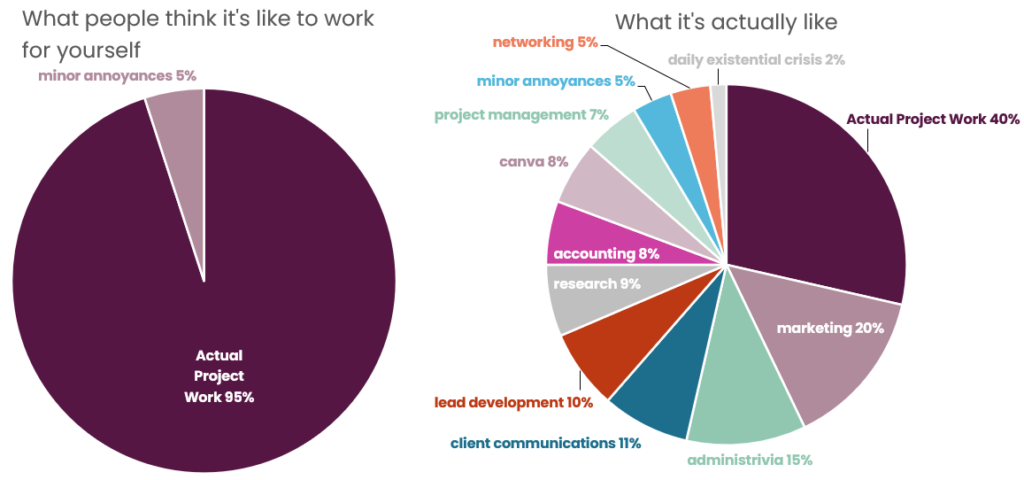
That’s the worst but most accurate chart I’ve ever made. Yes, the more accurate pie adds to more than 100%.
So what does this mean for you if you love the work but hate your job and wish you could work for yourself?
It means you:
Learn to love all the other parts. Ugh, what a drag. Right? Actually, it can be pretty damn cool to tackle “all that other stuff” in a way that aligns with your values. That’s how you run a business with integrity.
In Boost & Bloom, I show exactly how to build a company that keeps your ethics at the core. I’ll walk you through alllll that other stuff so you know what to tend to. I’ll teach you the shortcuts and the tech. And I’ll provide example after example of how to reflect your values along the way. You’ll earn a ton of money and still sleep well at night.

I only open enrollment in Boost & Bloom once a year. This is your chance to get started.
You can also hire out some of the Other Parts that you truly despise. It means your pie divides a little differently, with more time spent on managing others – so you’ve gotta figure out how to love that, too. (We’ve also got your back in Boost & Bloom as you build a small team.)
Many entrepreneurs don’t make it more than two years because they aren’t starting off with eyes wide open. I want you to be healthy and happy – even if that means you don’t start a business and instead just find a better boss.
Where to Focus When You’re Getting Started
Kevin O’Leary (of Shark Tank fame) was on Erika Kullberg’s (of Erika Taught Me fame) podcast and said mentors are people who give you early lessons learned. Given how true that is, take a seat with me and let Tamara Hamai mentor you for a sec.
Tamara runs Hamai Consulting. It’s an evaluation firm that works primarily with non-profits that focus on family and child well-being. Her website is super cute, take a look. Pitch perfect branding.
Tamara’s been in the business for so long, she’s what we would call “seasoned” and she’s now a mentor.
What I admire about her is how she’s embraced formal organizational roles and shifted herself out of the day-to-day, hands-on work so she can stay focused on company growth and leadership. That’s such a difficult transition for entrepreneurs to make.
But Tamara’s so good at it, she’s even created the space to test a dozen different marketing strategies, one of which resulted in a local news crew in her living room with a microphone and a camera in her face on a hour’s notice to interview her as a subject matter expert for that evening’s newscast.
(Tamara also recorded a guest lesson in Boost & Bloom on understanding your marketing funnel.)
Are some people just born to be great marketers?
Stephanie: Tamara, did you start your business already knowing a lot about marketing?
Tamara: I started the company because my employer at the time showed me that their values were in direct opposition to my values. I started my business so that I could do the work I wanted to do, the way that I felt it should be done. I had no background in business.
Stephanie: This sounds familiar.
Tamara: I put a lot of energy and time into learning how to run a business and how to do really good work with organizations and communities.
I learned about how to do my own bookkeeping and taxes.
How to write a proposal.
What insurance I needed.
Branding and creating business cards and a website.
I read tons of books, went to lots of workshops and classes, and dove deep into how to be a consultant.
When I wasn’t learning, I was serving my clients.
If I could have done anything differently, I would entirely change my focus from learning and client work to these two things: Being visible and building an alliance.
Stephanie: Oh this is some juicy hindsight right here. Say more about being visible.
Tamara: Marketing and selling are your most important activities every day as a start-up.
Start being visible from day 1. I spent years working on things inside my business, but hardly anybody (including potential clients) knew that I existed.
You need to be marketing and getting out in front of people. Start building relationships even when you don’t know who you’re serving or what you’re selling. As soon as you think you have something to sell, see if anybody will buy it.
Don’t worry about anything else until you have a minimum viable business model and you have validated it through sales.
Stephanie: Sometimes it can feel like visibility means … doing everything. So what would you not waste a minute on while you focus on visibility?
Tamara: When it comes to visibility, I worked so much harder than I needed to for a lot of years. I’m still not as visible as I should be. I wouldn’t waste any time creating visibility that requires learning lots of new things or going far out of what I already know and enjoy.
I hate social media (I have ethical issues with the data-as-an-asset business model) and a lot of other marketing activities require a lot of learning time for me.
I’d focus on being visible in ways that are easy and enjoyable. For me, that would be attending events, gathering people, and talking to people one-on-one. I also love teaching, so doing workshops at conferences would be on this list for me, too.
Networking, attending events, reaching out to talk to people over coffee/wine/whiskey, and doing workshops at conferences would have been the best way for me to spend 80% of my time in my start-up years. Thus, creating a strong, positive contact list and keeping in touch with them regularly.
Hi Reader.
Stephanie-as-the-writer popping in here to ask you to reflect on what Tamara just said in this part of the interview. 1. Figure out what marketing strategies feel natural to you. (They don’t have to be the same ones as Tamara.) And write to me to tell me what those are.
And 2. Get a contact list going and stay in touch with these people. I do that through newsletters (HI!) but you have options. The point is to set up a mechanism to keep in touch before you get out there wine-ing it up with folks so that you have an immediate way to stay connected.
Back to the interview.
Stephanie: So what about building an alliance? I see some new entrepreneurs who seem to have networking baked into their DNA and others who struggle with it more, like I do. How did that come about for you?
Tamara: Growing up, I had learned that success came from independent hard work and bootstrapping. But the truth is that no success that I’ve had in life was actually earned on my own, even though I worked hard for everything. None of us can do it alone. That’s where the alliance comes in.
The biggest decision you make is what you will and will not do with your time, energy, and resources. You’ll have better ideas and make better decisions when you’re working with other people.
The alliance that I have now that I wish that I had then: People who are my biggest supporters, who are invested in my and each other’s success, and are also unafraid of challenging me or showing me what I’m missing. A group where everyone can be honest, have their voice heard and valued, and have generative friction. We co-create ideas, solutions, and decisions in a safe space. They inspire me to be bold with my vision and hold me accountable to what I say I will do.
Stephanie: Now that you have the experience to speak from, what do you look for in an alliance?
Tamara: Who is in your alliance matters. The best members to have in your alliance include:
- People who have a diverse set of roles, perspectives, lived experience, and expertise.
- Mentors who have already achieved the kinds of big things you want to achieve, in ways that you admire.
- Peers one step behind, at the same level, and one step ahead of you.
- Someone who you know deeply understands you and your values (like someone who has known you a really long time).
- People with expertise/professional knowledge in critical areas (a lawyer, for example)
Once you have the people, you need to establish a safe and meaningful process for discussing issues and making decisions together.
Stephanie: And who would you avoid putting in your alliance? What mistakes do rookie alliance-builders make?
Tamara: Don’t just ask your friends or the people you already know for advice. You need people who will challenge you, but from a place of compassion. So, don’t waste time talking to people who are your friends who will support anything you do or anyone who thinks it’s ever helpful to “play devil’s advocate.”
Steer clear of people who tell you to do it their way, or that there is only one way to do things.
Don’t try to build your business alone while you sit in your makeshift office-dining room.
Don’t hire the first marketing consultant you find (I’m still getting over this one…)
Stephanie: I need to hear this story over wine.
Tamara: …or the first coach who says they can help you.
Most people know, are friends with, or are connected to people who are similar to them in terms of perspective, attitudes, and life experiences.
I’ve learned more by having mentors, coaches, advisors, friends, and colleagues in my alliance that are different from me and different from each other.
The people who are going to be your strongest supports are willing to challenge you to think differently while embracing the need to test and adapt ideas through your values for the business that you want to build.
Hi Reader.
Stephanie-as-the-writer back again to ask you to think through who is in your alliance. If it’s just your closest besties, Tamara’s telling you that won’t be the best way to grow.
Your alliance should make you feel challenged a bit. Slightly uncomfortable because your ideas are being pushed. Perhaps even pissed off from time to time.
Your alliance should also make you feel fully supported. Inspired. Buoyed through the different phases of your business, even when you become as seasoned as Tamara.
So, who is in your alliance right now? Count me in. And who do you need to add? Send me your list.
What Makes Work Meaningful
I learned a new word: Eudiamonia. It means “flourishing and living a life that realises one’s potential.”
I can’t pronounce it, but eudiamonia is all I want.
Work is surely only one component of a flourishing life, but it’s a big one.
Nikolova and Cnossen just published a study that identifies the three big factors that contribute to whether you feel your work is meaningful and satisfactory. The three big factors are:
Autonomy
Which means that you believe you have control over what you do with your time.
Competence
Which means you believe you can figure it out, even if it’s challenging, and that your effort contributes to a greater good.
Relatedness
Which means you believe you’re well-connected to your colleagues and bosses.
If you’re high on these three areas, the researchers say, you’ll be willing to withstand some underperformance in other aspects of job satisfaction. For example, the authors report that nurses usually have a high job satisfaction, even if there are parts of the job that totally suck.
I can hardly understand this, but those three factors were “4.6 times more important” than working hours, pay, benefits, and career advancement.
Pay and benefits were not as important.
Record scratch.
Perhaps if you are forced to choose between purpose and pay, you’d choose purpose. But it’s a false dichotomy.
When you work for yourself, you get to set your own pay and choose your own projects. You get pay AND purpose.
And that’s why these particular results excluded people who were self-employed. The researchers said this was because self-employed people can’t score on relatedness, since they have no peers or bosses. Huh? I have a wonderful group of colleagues. (And the best boss, just sayin.)
If they included the self-employed, it would certainly skew the results, but not because of relatedness. Because we’d be the examples of eudiamonia – where you can do incredibly meaningful work AND have flexible hours and a strong income.
It seems to me that the only way to really achieve eudiamonia is to work for yourself.
When the researchers pulled a subset of the data, where they could include the self-employed, they found “the self-employed enjoy greater mental health and subjective well-being compared to similar regular employees… This well-being premium is often attributed to the utility of being your own boss and having autonomy and flexibility.”
And, I’ll add, BEING PAID WELL.
Did your mental health change when you started working for yourself?
Mine sure did.
And, to note, the researchers pulled this data from the European Working Conditions Survey – so this sample is a particular cut of society. One where it’s common to go on holiday for the entire month of August and take 2 hour lunches with friends.
How do you think these results would differ for people in the American work culture? Or the Indian work culture? Probably a lot, though I don’t know how. So take this with that particular grain of salt.
The researchers added that “career advancement possibilities and working hours are more strongly associated with meaningfulness for the non-self-employed group.”
Which, I’m speculating, is because we the self-employed advance our own careers and set our own working hours. We don’t rely on the benevolent boss to deem us worthy. We are worthy. All of us.
If you haven’t yet taken that spring off the cliff to work for yourself, let this study be one more reason – it’s the best way to achieve eudiamonia.
If you already work for yourself, let this study light you up on the darkest days of entrepreneurism, when you’re dealing with the parts that totally suck. Your chosen path is the best set up to flourish and make the most of this one wild and precious life.
Ok, I can’t end on such a tender note. I’m going to leave you with the one quote from the article that made me LOL:
“Dur and van Lent (2019) document that about one in ten employees finds their job useless, with the share being the highest among those engaging in routine tasks as well as those in sales, finance, public relations, and marketing.” (Emphasis added is mine, I love you people and wish you a flourishing life.)
You Don’t Have to Be Passionate
I know this sounds impossible, but hear me out: You don’t have to care about the product you sell.
Honey, I can hear you saying “Why the heck would I quit my secure 9-5 to launch a company if I don’t care about the product? Like, deeply care. Like, maybe even more than I care about my spouse.”
Let me tell you about an entrepreneur I know – we’re gonna call him Kevin.
In college, Kevin needed some cash flow so he literally googled “low-cost small business ideas.” He got loads of results with titles like “25 Easy Small Businesses” and the whole concept seems totally laughable to me but hang on.
He’s scrolling these lists and kinda just randomly picks one. It’s now so famous that I’m gonna make up his product for the purposes of his privacy: cheap earbuds you can gift people who insist on Facetiming in public.
Even though I think speakerphones in public should be a crime, Kevin doesn’t care at all. It’s never even crossed his mind that this is an issue.
But he launches the company anyway, constructing cheap earbuds in his college apartment living room.
They’re wildly popular, so pretty soon he’s shopping for a production facility and a warehouse. He hires management and marketing people who care deeply about how your conversation with your BFF while she’s in Portugal belongs to just you and your bestie.
The company skyrockets.
They produce earbuds in different colors. They enter into branding agreements and generate logo-ed styles. Everything’s coming up Kevin.
Is this when the plot turns and we discover that Kevin’s lack of passion for earbuds means that he never listened closely to the consumer, thus leading him to mistake after mistake?
Not at all.
In fact, when the data showed that the brown sparkle version wasn’t selling, he immediately chopped it. Even though it was his favorite.
He lacked an emotional investment that would have otherwise caused him to stay on a sinking ship.
Sometimes being indifferent to the product can give you a better sense of objectivity, a clearer mind for that critical decision-making.
Most entrepreneurs plant their own flags because of how much they love the actual work.
This is a terrible idea.
You’ll never spend your whole day just chilling in your office, grinning ear-to-ear while you just do the actual work. You’ll be sending invoices, developing systems, creating a vision, and marketing your ass off.
Going into business because you’re passionate about the actual work is a bit Pollyanna.
You don’t have to be as actively dispassionate as Kevin, but you gotta respect the way it’s helped him.
In grad school, I remember my shock as one of my fellow classmates defended her dissertation, where she hadn’t done much of the actual work. She hired out her data collection, analysis, and report-writing.
I’m like “You can get a whole PhD without actually demonstrating you know how to conduct a study?”
Her advisor said “Of course. Think about it: Most scholars aren’t out there transcribing their own interviews. They hire grad students. You don’t have to actually do the work. You have to know how to design the process and guide others to success.”
Hm.
Hmmmmmmm…….
Actually, yep.
In fact, that’s what CEOs do.
Unless you’re watching Undercover Boss, the CEO isn’t – nay, CAN’T – spend their days in the weeds, cooking the fries, packaging the earbuds, or coding the focus group data.
Instead, they have to focus on listening to customers, setting the tone, creating the culture, establishing the high-level plan, and developing the systems to stay on the pulse. If anything, that’s what Kevin is passionate about.
Earbuds could become obsolete this afternoon and he’d have the infrastructure to start up something else tomorrow.
Have I convinced you at all that perhaps a little bit of dispassion could be helpful?
If you’re still thinking something like “the secret to my success is that I care about the product” that’s ok – keep the passion. But be very clear that you’ll also need to grow passionate about backend business matters and get comfortable murdering your darlings.
Talk To Your Boss
Ryan (fake name) told me over Zoom that he was thinking about launching his own business, training dogs to walk on their front legs (fake business).
Me: Cool! When are you putting in your two weeks?
Ryan: Oh I wasn’t going to quit the day job. I just want this to be my side hustle until I can grow it more.
Me: Uh, but isn’t your day job also training dogs to walk on their front legs?
Ryan: Yes, but my boss is cool.
<red flags whipping up in my head>
Ryan: He saw some of my free YouTube videos and totally supports.
Me: He totally supports because that’s bringing business to him, since you work for him. You need to (1) check your employment contract for language around side gigs or competition and (2) talk to your boss about your plans.
Ryan: Ok yeah yeah thanks for the advice but I’m pretty sure I’ve got this.
<six months later, in which time Ryan did not talk to his boss but did announce the launch of his company>
Ryan: My boss is pissed.
Predictably so. I’ve seen this same pattern happen so many times, <insert joke about nickels and retirement>.
Margaret (fake name) got this same advice from me and said “It’s totally cool, our previous CEO knew about my side business and even encouraged me to do it.”
My dear Margaret, did you say “our previous CEO”? As in the one who is no longer your boss?
That’s like telling the cop who pulled you over for speeding that the last cop just let you go free.
Margaret did not talk to her new boss.
Margaret blasted her new business all over social media.
Margaret got fired.
Don’t be like Margaret.
Talk to your boss.
Say something like “I wanted to let you know about my plans to start a side business. I don’t anticipate that it’ll have any impact on my performance here. But I’ll be announcing it soon on social media and I don’t want that to take you by surprise.”
Be prepared with information about what your contract says regarding side work. Especially so if your side gig is similar to the work you perform in your day job.
You may have to speak to details of your plans, like your anticipated clientele, in order to illustrate how you aren’t creating a competing business.
But you don’t want to overindulge.
It’s a tricky conversation, for sure.
I’m not trying to fool you into thinking this conversation is going to be easy or clean.
It could get uncomfortable.
It could lead to putting some agreements in writing or, sorry about this, even more meetings.
Even if you follow my guidance here, there are no guarantees.
I *had* talked to my boss. I had my boss’s approval to work side gigs in writing. Girl, I had receipts!
And it still didn’t matter to HR, who told me I had two weeks to close my side business.
Their rationale: The topic I wanted to develop on the side – data visualization – could potentially become something the company wants to focus on also, at some point in the future, if they so decided one day. So, my side gig was considered competitive.
Hypothetically.
But, listen, bottom line is HR doesn’t care whether their logic is cohesive or fair. It doesn’t matter what your boss put into writing.
So why should you talk to your boss, if the conversation amounts to protection as fragile as an eggshell?
Because you’ll feel like you did it right. You’ll have gone about the process with your ethics and integrity intact, no matter the outcome.
On the other hand, don’t talk to your boss.
If you know your employer explicitly bans side gigs of any kind or you just have a boss that’s a little unhinged, don’t tell them about your plans.
You’ll be fired faster than you can tweet that you’re open for business.
Instead:
1. Build up the infrastructure of your business while you’re still employed.
2. Hoard your salary in a savings account.
3. Then quit your day job and launch your new website in the same day.
Hello My Fellow Perfectionist
This is the life hack that allowed me to complete monumental projects, like launching a business, finishing a dissertation, publishing books, giving birth. You know, the stuff that’s really freakin hard. Emotionally, mentally, even physically. The stuff that shifts the course of your life, if you can just actually see it through.
The life hack is:
Done is better than perfect.
Perfectionism often comes from growing up in a culture where your flaws got a lot more attention than your triumphs.
This doesn’t even have to be something that happened within your household. Just existing as a woman in the United States exposes you to the circumstances that can lead to perfectionistic tendencies. White culture, especially, values flawlessness – as if it’s possible.
If you’re told on repeat that you’ve fallen short in some way, you course correct. You raise your standards (because obviously they were previously way too low or you wouldn’t have had a flaw) and you become a hypervigilant monitor of yourself.
You’ll catch those flaws before anyone else notices them.
As a recovering perfectionist, I’m not gonna lie to you. Character traits like high standards and attention to detail have both prevented mistakes (like marrying that one guy who my friends hated) and driven many successes (like having a baby while finishing grad school).
But when you don’t reign it in, perfectionism actually keeps you stuck in a standstill.
During dissertation days, Done Is Better Than Perfect played continually in my head. Because my perfectionism would have me thinking, “I bet there’s one more journal article out there that would really take my literature review all the way to the top. If I don’t fill this gap in my chapter, my committee will notice and I won’t pass, journal reviewers will reject me, and all this work will have been for nothing. Let’s head back to the library and dig for a few more hours.”
Those thought and behavior patterns are fine once or twice. But when you’re doing that on the daily – that’s how you never finish your dissertation.
Too afraid my weakness will be exposed, so stay in “development mode.”
If I don’t move, nobody will see me. Yet that’s the problem – nobody will see you!
To make great things for this healing world, you have to be seen.
You have to risk that there’s a typo somewhere in the manuscript you haven’t caught.
Indeed, after I wrote my first book, I got emails from eagle-eyed readers who said “on this page you said x but on that page you said y,” or “on page 50, you wrote it’s when you should have used its.”
A perfectionist’s worst nightmares, come true.
And that’s after I read every word. Multiple times. As did my editor. And a copyeditor.
So it goes.
Those tiny errors don’t take away from the book’s impact. In fact, every email about a tiny error also said things like “I love this book so much, I’m absorbing every single word. This is changing my life.”
The thing is: Your perfectionistic cultural upbringing means you won’t put crap out there in the world. Your high standards will always prevent you from doing so. It’s going to be good. You produce quality. Even if there’s a typo.
So just focus on getting it done. Of course, give your work one thorough review (how could you not). Then hit Publish. Send the email. Launch the reel. Just go.
The world is waiting.
How To Launch a New Offer
My friend, this isn’t my first rodeo. I’ve launched several businesses, each one hitting six figures right out of the gate.
So you’d think I’d have the launch process totally figured out by now. While experience did help me foresee some steps I’d need to take, I still fumbled and it took me way longer than necessary.
As usual, I’d love for you to learn from my mistakes.
So here’s the diagram of my last business launch. Whether you’re launching a totally new business or just looking to sprout a new branch for your existing business, you’re likely to run through the same phases. Though if you look carefully at my mistakes, you can probably do it faster.
LAUNCH PHASE 1

I truly believe most businesses are born from frustration. When we find ourselves engaged in something so poorly executed, we’re like “I could totally do this better.” In fact, a lot of armchair consultants on Twitter pull inspiration from this very place. Your hyper critical friend lives here and has a dozen new business ideas every day.
Nothing much beyond grumbling typically happens – until the flash of a truly better idea comes, along with the details that make it a viable product. I had fluorescent flashcards and a notebook and a lightning bolt at 3am that helped me hammer out the product and the plan.
Then I entered the likely avoidable span of time where I overthought it. The plan was awesome. My experience told me it was going to take me a lot of time and energy to turn it into reality.
And then I questioned myself.
Where would the time and energy come from?
Did I actually even want to do it?
Would people buy this product from me? Who, exactly?
Haven’t a bunch of other people already done this? What makes me think mine will be better?
I know what’ll help me answer these questions: Listening to every single possible business coach.
Geez that was a huge waste of my time.
You’d think, by now, I’d know not to let these thoughts distract me. Maybe this stage is unavoidable. Yeah, maybe we all have to go through it. But it doesn’t have to take as long as mine did. And we can feel these feelings while also continuing to make progress. Without letting those self-doubting thoughts freeze us in place.
LAUNCH PHASE 2
The key to getting out of the self-doubt whirlpool is to focus on the people you want to serve.

They have needs and they don’t have time for you to mess around.
In my case, I have new and seasoned entrepreneurs in my DMs nearly every day, asking to pick my brain for 15 minutes. I said yes to a few of these folks, seeing it as an equal exchange – I’ll give advice and they’ll teach me about my audience.
Once I had my audience figured out, I started to build the business’s infrastructure, with those particular people in my mind at all times.
I sorted out the framework/structure/package for my services. This is the part most people skip cause they don’t know they need it. But you have to create the container. Give it a name.
Then I brainstormed the business name and connected with my web developer to (1) figure out if we could even do this, (2) research URLs, and (3) start the build.
People usually spend too much time in this phase. They’ll create business cards and deliberate over the web site design and consult 800 people about their business name…. and then never actually launch. Don’t get stuck here.
Then it came time to actually build the program. I had to write out my curriculum – which ended up taking me much much longer than I had planned. The amount of solid business advice that had been just rolling around in my gray matter – honey, the curriculum was longer than any book I’ve ever published.
Took me forever to get it all out of my head.
At the same time, I was planning the marketing strategy, coordinating with my web guy, and shooting the videos. This was a super intense time that I wish I had been able to spread out more.
LAUNCH PHASE 3
Phase 3 is go time.

I launched with a newsletter (hi! This one!) while I was still finishing the website build and testing everything.
I developed some freebies while still testing everything.
Then I announced the new program and opened enrollment. The hard work is supposed to be done at this point so I make it a priority to celebrate with my friends and family.
However, students were unearthing issues we hadn’t found in any previous testing. I don’t know how. But this seems to happen every time I launch. And I think it may be unavoidable? This is why restaurants have soft launches. Maybe we all need our own version of a soft launch.
Every step of the way I’m making mental note of what worked and what didn’t. I formally collect all of those thoughts in a debrief session with my project notebook. *IF* I’m gonna ever do this again, there’s no freakin way I’ll remember every single tweak I’d want to make unless I write them down while they’re fresh in my mind.
Then I chew on those lessons learned while watching student successes and monitoring my own mental health and it’s those things together that lead me to the final point in the process: Do I want to do this again?
And I do.
I’ll open Boost & Bloom again in Feb. Get on the VIP list for early access and a discount.
I’m already thinking about another business, too. I’m in the “I can do it better” stage. This next time around, I’ll be on the lookout for the tedious overthinking stage and do my best to skip it.
I hope you will, too.
What stage are you in? How long are you giving yourself until the next stage? Do you even know what your next stage is? Email me with a note about where you are right now.
Your launch doesn’t have to look like mine. But please at least consider my sequence of steps and my mistakes and make adjustments to get to your next launch faster, better, stronger.
Looking Forward to Freedom
I got to cutest, most sweetly naïve DM from Angela:
“Can I have my own business and also have a lot of time off, especially in the summers, to spend with my young children?”
What would you say to Angela?
My reply was “HELL YES! That’s kinda the whole idea!”
When you work for yourself, you get to create the life you want to live.
In a big picture sense, that means you aren’t necessarily tied to a specific geographic location – you can work wherever you want, in theory.
In a small picture sense, it means you have the freedom to construct each day of your life on your own terms. However you want it to go. You get to make it up!
I freakin love that level of autonomy.
Angela will too. Because it means that if she wants summers off with her kiddos, she has the freedom to book all of her clients during the school year, even during school hours, so that when the bell rings, she’s there to pick them up.
It might seem like this is only possible if you work in a digital consulting space, but not so.
My all time favorite pizza shop closes for entire weeks out of the year so they can all go on vacation.
The framemaker a few blocks from me put up a sign that said “Out for the summer. Reopening September 5. By appointment only.” The quality of his work is so high and people are willing to pay a premium for it, that he can have a brick-and-mortar that’s only open for appointments.
In a more micro picture sense, the way you structure each day is a part of the freedom entrepreneurship gives you.
Lots of newbie entrepreneurs initially set up their days to mimic whatever corporate or academic environment they came from. 8 hours a day, butt in chair. Work through lunch. Clock out at 5.
And if that’s your jam, rock out.
But you’ve got options.
You’ve got freedom.
My daily structure has changed with the seasons of my life. When my kid was younger, I mostly followed the school day schedule, working 8-3 each day of the school year and 10-4 during the summer, getting in exercise and errands after school let out. (PS – those are 6 hour work days, in case ya didn’t notice.)
I have LOVED being there for my kid before and after school – a privilege that so many folks can’t usually enjoy.
Now that my kid is older, I wake up and read a book with my coffee. I go for a long walk or tune into a YouTube yoga class or pretend like I know what I’m doing at the pilates studio. Then I start work around 10:30. Heck, I’m writing this at 11am on a Saturday because he’s a teenager and he’s still sleeping.
I didn’t work Fridays at all this summer. I’ve taken SEVERAL weeks of vacation. We’re looking at a house in another country.
Other people embrace their night owl nature and work 3-midnight.
Some folks, like the owner of my nail salon, want a weekday off to grocery shop or whatever without the crowds, so they trade Sundays for Thursdays.
I’ve heard of people who make all the money they need for the year starting in January and as soon as they hit their financial goal, the rest of the year is totally off.
And this is all aside from the new digital nomad model where you literally take your computer and work from the world’s best coffee shops.
I’m just throwing out ideas here, to help you dream.
How you shape your day and your life is up to you.
That’s the kind of flexibility and freedom you get when you’re the boss.
But listen: The only way you can afford to work 4 6-hour days per week and take off as much time as you want and work from anywhere in the world is to be highly focused and self-disciplined in the time you are on the clock.
I can’t spend that time scrolling IG, hopping on every latest trend. I have to give my sole focus to the actions that keep my business strong.
With freedom comes great responsibility.
So, my friend, what will you do with that freedom? What’s the thing you want to have space for in your day or your life, that entrepreneurism can bring you?
For you seasoned entrepreneurs, what have you enjoyed most about that flexibility? Or did you forget that you’re the boss?
I can’t wait to hear what you have to say. Email me.
There’s joy in that freedom. Let’s find it.
Just Start
I’m gonna pre-apologize right now. Cause this post from Sun Yi’s Instagram is so accurate, it hurts.

Let’s say I want to buy a house in Portugal. It’s been a lifelong dream and I finally feel like I’m in a place in my life where it could reasonably happen soon.
I’m absolutely not jumping on a plane and flying to Lisbon and buying the first house I see.
I’m going to read up on the rules of international house buying. Join an online ex pat community and listen in for advice on fun neighborhoods. Talk to my family.
Then – and this is THE MOST IMPORTANT PART – I’m going to start a conversation with a real estate agent in Porto. That’s when it gets real. And that’s the step we put off.
Because there’s always more research to be done. Another influencer with the one tiny tip that’ll make or break you – better keep scrolling. Right?
Honey, you’ll scroll your whole life away.
The difference between being a wantrepreneur and an entrepreneur is in the balance you strike between researching and doing.
Stop researching and go get a client.
How?
How does anyone get clients? You sell yourself. Talk about your work. Reach out to people who need your services.
That’s when it gets real.
Real scary.
“I want to be an entrepreneur, but I’m scared it won’t work. I’m scared I can’t do it.”
For reals. Those are true legitimate feelings that don’t fully go away, ever. It IS scary.
Now that we’ve settled that, can you view fear as that annoying colleague down the hall and just do your work anyway? Todd in Accounting as been training you for this for years.
There’s just no other way around it. Put yourself out there and focus on getting clients first. You’ll figure out everything else as you go.
“I don’t know what steps are involved – better read yet another CEO’s book.”
Everyone’s path is going to look differently but the one thing you can trust is that, once you start walking, the next step will be revealed to you.
I had just a couple clients under my belt when a prospective and I were emailing back and forth and she said “This sounds great. Do you have a website I can show to my team members?”
No ma’am I do not. But I’ll have one up tomorrow.
The next step shows up at your feet if you just get started.
You build it as you fly.
“I need a lot more experience first.”
Um, how do you think you get experience? You have to go get clients.
You might be thinking, who wants to work with someone so new? You wouldn’t want a surgeon on their first surgery, would you?
I don’t know about that. The best cleaning I ever got was from a dental hygienist who had just graduated. She was well-researched – no one could know more about the most current best practices. And her freshness made her sooooooo careful and detailed.
Listen, your experience will perfectly match someone’s budget. Just go find your someone.
So yes, of course, you need to do some research. But instead of thinking that there’s a research phase and then a doing phase, think about researching and doing simultaneously, back and forth, onward. Both at the same time.
If you want to actually reach those big dreams – that house in Portugal, that business empire, that award-winning YouTube channel – you have to switch to DO mode. Contact the real estate agent, connect to your first client, make your initial video.
Yeah, the first one will suck. So get it out of the way as fast as you can.
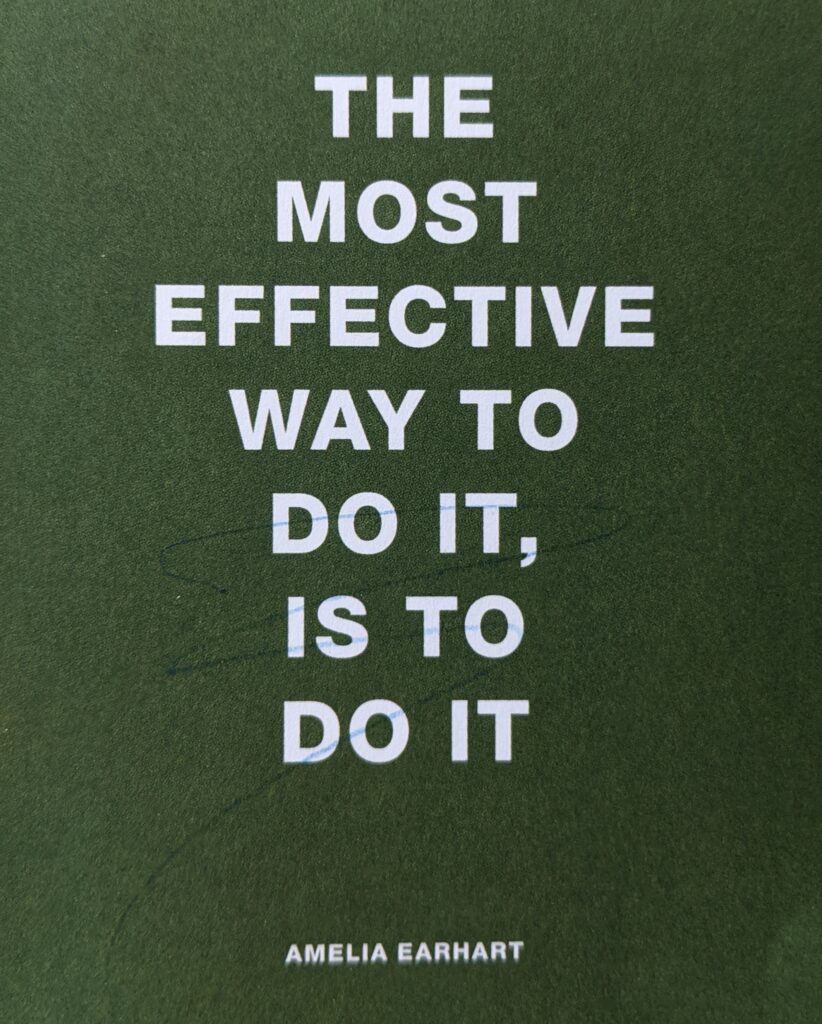
So, what’s the next big thing you want to do? The thing you’ve had your heart on but haven’t actually *done* yet? Hit me up for a little pep talk.
Two Phrases Every Entrepreneur Should Know
Would you take a wine recommendation from a teenager? Of course not. People want to partner with someone who has experience.
Which is why the question Tom sent me is so common among those of you considering entrepreneurship: “How much experience would you recommend having before going it on your own doing the consulting route? Do I need to consult beforehand?”
Though it might look like it on the surface, this question is not just for newbies.
Seasoned entrepreneurs who want to expand their empires into new (and perhaps more lucrative) markets run into this same issue.
People pivoting to new fields, despite a decade of experience, face the same fear.
No matter how long you’ve been on the block, you need two key phrases in your entrepreneurial vocabulary:
“In my experience with similar situations, I recommend…”
The purpose of this phrase is to convey confidence to your clientele. You can be trusted. You’ve done this sort of thing before.
All this means is that you need enough experience to say I’ve seen this.
You don’t have to have that experience in the same industry you’re trying to break into right now. In fact, your cross-industry experience is an asset.
You don’t have to have that experience through paid work. Real life grad school projects or free time portfolio development exercises absolutely count here.
But the truth is that even though I’ve been in business for a dozen years and I like to think I’ve seen it all, a client will still surprise me every once in a while. That’s why you need this second key phrase:
“I haven’t run across this yet, but I have some ideas and I’ll do some research and get back to you.”
You don’t need to know e-v-e-r-y-t-h-i-n-g but you do need to have the unwavering faith in yourself that you can figure it out.
Talented entrepreneurs can find the answer even if they don’t have it right now. They’re resourceful. They’re also timely – you’ll get those ideas back to your client within 48 hours.
I’ve seen the experience question hold too many would-be successful entrepreneurs back from starting their empires.
How much industry experience did you have before you launched your business? Click here to tell me in an email. My hunch is that it’ll be a very wide range. The path into entrepreneurship has 1,000 different entry points.
Cake Bakers
Being an entrepreneur is more trendy than ever. More and more people are looking to make money on their own terms while following their passions and keeping their sanity intact. I’m all about this.
Except, like any trend, entrepreneurship is not for everyone. Come to think of it, neither are Crocs, but that’s a topic for another time.
There’s A LOT that goes into the business side of growing an empire.
And in my experience, the things that should stop people from starting their own businesses usually don’t. The inverse is also true: the things stopping most people are misconceptions that need to be trashed.
So what actually should stop you from becoming an entrepreneur? Well, one of the signs that this game isn’t for you is if you’re really only interested in doing the thing you love all the time.
I call this personality the Cake Baker.
The reality is, opening a bakery doesn’t mean you bake cakes all day. And starting your business doesn’t mean you’ll do the one thing you love doing all day long.
You actually wear all the hats in the business. You get to think strategically about growth. You handle the spreadsheets and budgets, decode the legalese in contracts, manage clients (and their expectations), market your tushy off, the list goes on.
If you’re the right person for the job, you see all of that as an exciting opportunity. Cake Bakers see it as a drag.
Wanna just bake cakes all day? Get a job at someone else’s top tier bakery, Babe.

